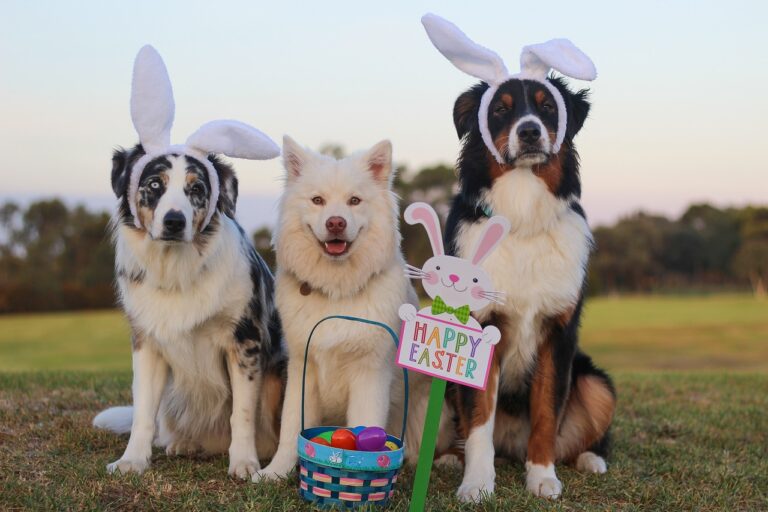
Easter is a time of joy, celebration, warmer weather and, of course, lots of chocolate! But it also brings potential hazards for our furry friends. Pets, curious and eager to explore, may find themselves in risky situations, whether it be around certain foods or even out in the beauty of nature. In this article, we’re highlighting some of the common Easter dangers for pets and tips on how to keep them safe.
Generally, at this time of year, there’s no shortage of sweet treats in our homes, though this does mean there are more opportunities for our pets to get their paws on whatever they may find lying around.
Surveys by the British Veterinary Association (BVA) have found that around three in five vets treated pets for chocolate poisoning during the Easter holidays. These stats have changed very little over the years, indicating that more needs to be done to highlight the danger chocolate poses to pets.
Chocolate and sweets are toxic to both dogs and cats, containing substances like theobromine, xylitol and caffeine that can cause side effects like vomiting, diarrhoea, rapid breathing and increased heart rate, among others. Symptoms can take anywhere between 4-24 hours to show, so it’s really important to get in touch with your vet immediately if your pet has eaten anything they shouldn’t have.
Dogs are typically the ones who are most tempted, as cats and rabbits can’t taste the sweetness, but it’s best to keep any Easter eggs and other human treats far out of reach in fridges, cupboards or drawers.
While spring is a time where our gardens and homes brighten up with beautiful blooms, it can also pose a serious problem in cases where some plants are toxic to our pets.
For an extended list of plants that are harmful to pets, please read our other articles:
They’re an Easter favourite for us humans, but come with a word of warning: don’t share these with your pets! Raisins and sultanas, along with many other dried fruits, are known causes of kidney failure in both cats and dogs, even it’s just a small quantity.
If you arrange an Easter egg hunt in your garden, just make sure that all have been found before you let your dog outside, as they’ll easily find any that have been left behind. Even if you’ve used plastic or hard boiled eggs instead of chocolate ones, these can still be harmful, causing blockages or other digestive issues.
The hustle and bustle of Easter celebrations can be overwhelming for pets – particularly if travel is involved. Many pets don’t respond well to changes in routine, which can cause stress. Look out for changes in their behaviour, including becoming withdrawn or more reactive, panting and shaking, or needing the toilet more than usual.
We hope you and your pets have a safe and wonderful Easter!
If you suspect your pet may have eaten something they shouldn’t have, please get in touch with your local St Kitts practice:
St Kitts Vets Hartley Wintney: 01252 844044
St Kitts Vets Basingstoke: 01256 844944
Crookham Park Veterinary Centre: 01252 913990
Firgrove Veterinary Centre: 01252 877799